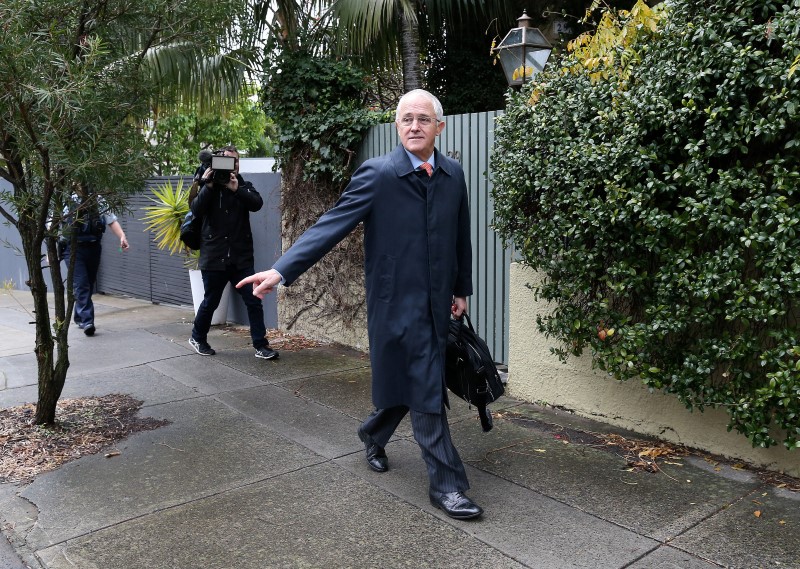Image: Australian Prime Minister Malcolm Turnbull is followed by a televsion camerman as he walks to his car outside his home in Sydney, Australia, July 5, 2016. AAP/David Moir/via REUTERS
By Matt Siegel
SYDNEY (Reuters) – Embattled Australian Prime Minister Malcolm Turnbull on Wednesday pulled within striking distance of the votes needed to form a narrow majority government in a cliffhanger election that has left the nation in limbo and his leadership in doubt.
Electoral officials are counting 1.5 million postal and absentee votes that will be crucial to the result of Saturday’s poll, which saw a swing against Turnbull’s conservative Coalition government and the rise of populist independents.
A final reckoning may not be known for days, possibly weeks, leaving Australia in a political vacuum. Turnbull’s gamble in calling an early election failed to deliver a clear mandate for his agenda of corporate tax cuts, and raised the prospect of an internal challenge to his stewardship of the centre-right Liberal Party.
The latest projections by the Australian Broadcasting Corporation shifted two seats into the government’s column, giving Turnbull’s Liberal-National coalition 70 out of 150 lower house seats, and the centre-left Labor opposition 67. Eight seats remain too close to call.
Both major parties are agonisingly short of the 76 seats needed to form a majority government in the House of Representatives, and negotiations are already underway with independents who will hold at least four seats.
“I think they can get to 76,” ABC polling expert Antony Green told ABC’s Radio National, referring to the Coalition.
“It’s still either a very, very narrow Coalition majority or hung parliament. The Coalition will have more seats than Labor.”
Turnbull’s disastrous polling has led to attacks from inside and outside his party after he called elections in both houses of parliament in an attempt to settle a querulous upper house Senate that had repeatedly blocked industrial relations bills.
The surge in voting for independents, combined with rules that make it easier for smaller parties to win Senate seats in a so-called double dissolution of parliament, will likely make it impossible for Turnbull to push through policies including a A$50 billion ($37.19 billion) corporate tax break over 10 years.
Even if the coalition wins a narrow majority in the lower house, Turnbull would then have to shepherd legislation through an even more intransigent Senate.
The election was meant to end political turmoil that delivered Australia four prime ministers over the past three years. Instead, it left Turnbull’s authority in tatters less than a year after he ousted then prime minister Tony Abbott in a party-room coup with a promise of stable government.
Turnbull is being blamed for a series of missteps, beginning with triggering the double dissolution of parliament in May, and a long eight-week campaign that allowed time for Labor to hit key issues like healthcare and company tax cuts.
(Reporting by Matt Siegel; Editing by Stephen Coates)
Copyright 2016 Thomson Reuters. Click for Restrictions.


